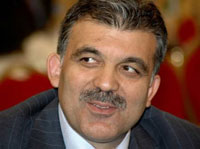Turkish parliament prepares for presidential voting
The parliament of Turkey prepars for the first round of presidential voting Monday. The likely winner, Abdullah Gul, promised to promote harmony among the country's feuding leaders after months of political crisis.

Foreign Minister Gul, a devout Muslim, is expected to win the vote next week, months after the military-backed secular establishment blocked his election amid fears he would use his position to weaken the country's official non-religious status.
Voting on party lines suggests Gul will probably win the contest against two less well backed opponents in the third round on Aug. 28.
The main opposition secular Republican People's Party has said it will boycott the vote fearing Gul, an ally of Prime Minister Recep Tayyip Erdogan, would help undermine secular principles, like the ban on Islamic headscarves in government offices and other public places.
Gul's wife, Hayrunisa, once appealed to the European Court of Human Rights for the right to wear the scarf to a university. Gul has defended his wife's right to wear a headscarf.
"If I am elected, I will pay utmost importance to harmony" among key national players, Gul told reporters Monday, and added the "rights of the people are guaranteed under law."
Gul and Erdogan have said they are not Islamic fundamentalists, citing their promotion of reforms to advance Turkey's bid to join the European Union. But they have also sought to improve ties with the Islamic world.
Gen. Yasar Buyukanit, the chief of the military, said the military would not quarrel with Gul if elected, but signaled that his wife would not be welcome for ceremonies at military facilities where wearing headscarves are banned.
The nomination of Gul for president earlier this year sparked a crisis, with the military threatening to intervene to preserve the secular regime, and led to early elections.
However, Erdogan's Islamic-rooted Justice and Development Party made a strong comeback by winning 46.6 percent of the votes in last month's elections and nominated Gul again for the presidency.
The government would likely benefit from Gul's election as president, who has the right to veto legislation and appoint high-ranking officials.
A boycott cannot stop Gul's election. The Justice and Development Party does not have the two-thirds needed in the first two rounds of voting but only a simple majority is needed in the third round.
The two other candidates are Sebahattin Cakmakoglu, a former defense minister, of the Nationalist Action Party, and former state minister Tayfun Icli of the small Democratic Left Party.
Their parties hold 70 and 13 seats respectively and they have no chance of election against Justice and Development Party's 341 seats in the 550-seat Parliament.
Some independent lawmakers have also pledged support for Gul.
Subscribe to Pravda.Ru Telegram channel, Facebook, RSS!


